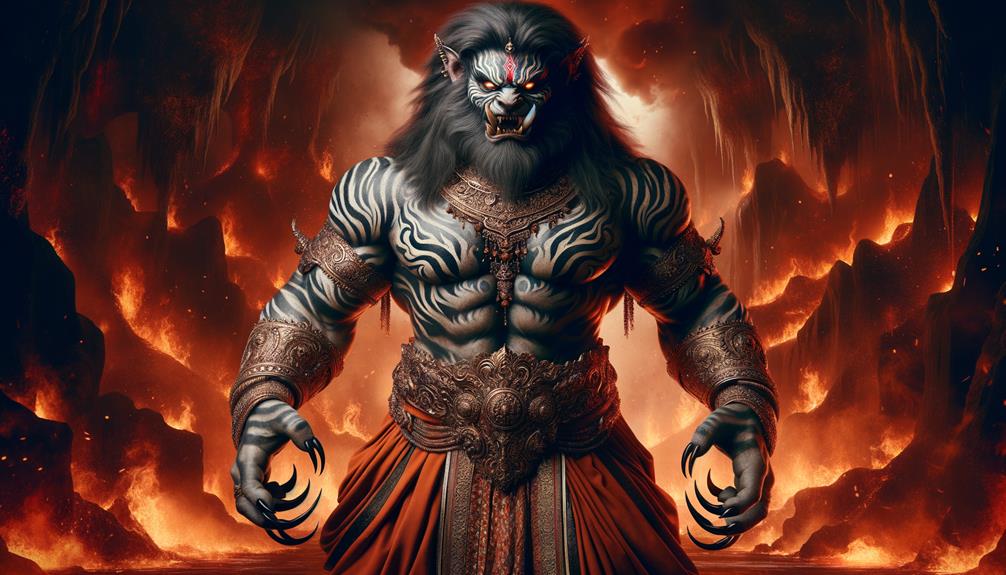In the captivating realm of Hindu mythology, the Rakshasa emerges as a compelling character. This entity disrupts the otherwise tranquil cosmic order, becoming an intriguing symbol of chaos and disruption. As a mythology enthusiast, I've often noticed the striking similarity between the Rakshasas and the demons of other lore, such as Christianity's fallen angels, the Djinn from Islamic traditions, or the Titans in Greek mythology. These entities do not merely personify evil, but rather, they echo the more destructive, darker aspects of existence. These elements are essential for maintaining equilibrium.
The Devas and Rakshasas: A Cosmic Dichotomy
The Devas, the Rakshasas' counterparts, personify light and creation. Conversely, the Rakshasas encapsulate darkness and destruction. They are not simple manifestations of wickedness. Instead, they are complex, multi-dimensional beings with unique narratives, motivations, and destinies. So, why are these entities so crucial to the grand narrative of Hindu mythology? Let's delve into this fascinating topic.
The Rakshasas are not just one-dimensional villains. They're intricate characters with their own tales and destinies. This complexity contributes significantly to the captivating narratives of Hindu mythology. As we unravel these characters, we discover their purpose, their motivations, and their indispensable role in maintaining cosmic balance.
Rakshasas: Not Evil, But Necessary
It's crucial to note that Rakshasas aren't evil incarnate. They represent the destructive aspects of existence necessary to maintain balance. Think of them as the night to the Devas' day, the storm to their calm. They're integral to the grand cosmic narrative, bringing depth and contrast to the stories.
In conclusion, the Rakshasas' role in Hindu mythology is profound and complex. Their intriguing narratives and characters bring depth and dynamism to the rich tapestry of Hindu mythology. They represent a necessary destructive force, maintaining the balance of the cosmos, much like their counterparts in other mythologies. Engage with these stories, delve into their depths, and you might find that the Rakshasas are not as dark as they seem. They're essential characters in the grand narrative of existence, bringing balance to the cosmic order.
Origin and Meaning of Rakshasa
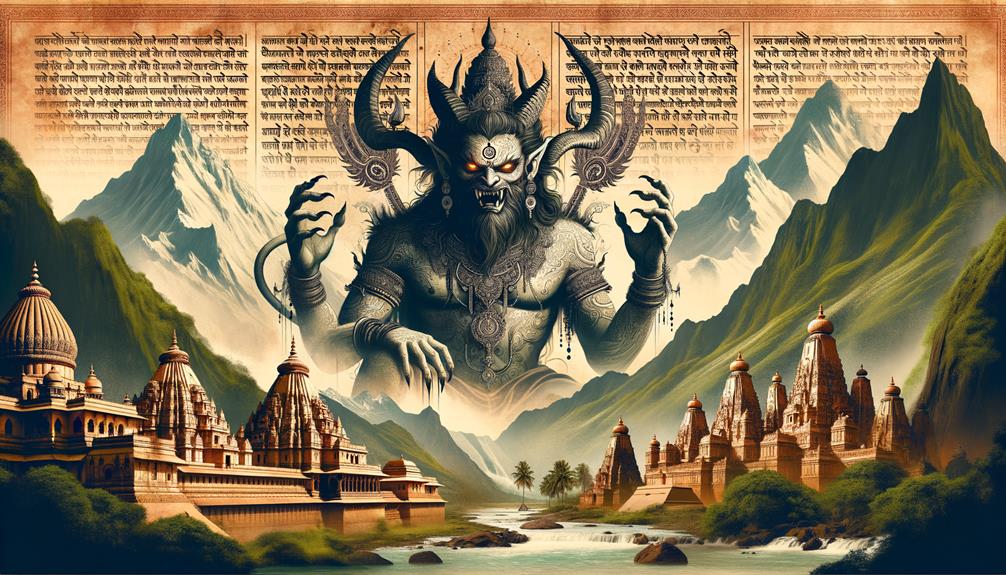
Discovering the Rakshasas: Origins and Meanings Across Cultures
Delving into the roots of the fascinating *Rakshasas*, these mythical beings have a rich and varied history across Hindu, Buddhist, and Jain cultures. Each tradition offers a unique perspective, metamorphosing Rakshasas from formidable warriors and illusionists into peace-loving vegetarians.
The Rakshasas in Hindu Mythology
Hindu mythology reveals an intriguing origin story of Rakshasas. They were said to have sprung from the foot of Brahma, one of the chief Hindu deities. This creation story is often associated with their attempts to control water resources in the ancient texts, the Puranas. In this context, Rakshasas are represented as terrifying creatures, boasting sharp fangs and claws. They are often depicted as malevolent beings, infamous for their growling and carnivorous tendencies.
However, Rakshasas are not just about brute force. They are also hailed as mighty warriors, skilled magicians, and master illusionists. They have been instrumental in many epic battles, aiding both benevolent and malevolent factions.
Rakshasas in Buddhist and Jain Traditions
The portrayal of Rakshasas takes a different turn in Buddhist lore. In Chinese and Japanese traditions, they are known as 'luosha' and 'rasetsu' respectively. They continue to hold their place as powerful beings, but their ferocity is somewhat toned down.
In stark contrast, Jainism presents a completely different image of Rakshasas. Here, they are shown as a highly civilized and vegetarian community, a far cry from their demonic representation in Hinduism.
The portrayal of Rakshasas is a perfect example of how a single entity can be viewed so differently through various cultural lenses. This diversity adds richness to their mythology, making them an intriguing study.
The Many Faces of Rakshasas
In essence, the Rakshasas' image is not uniformly monstrous or heroic. They are a testament to the complexities and layers that can exist within mythical beings. Whether they are seen as fearsome demons, powerful warriors, or peace-loving vegetarians, the Rakshasas continue to captivate with their multi-faceted personas.
Rakshasa Description and Powers
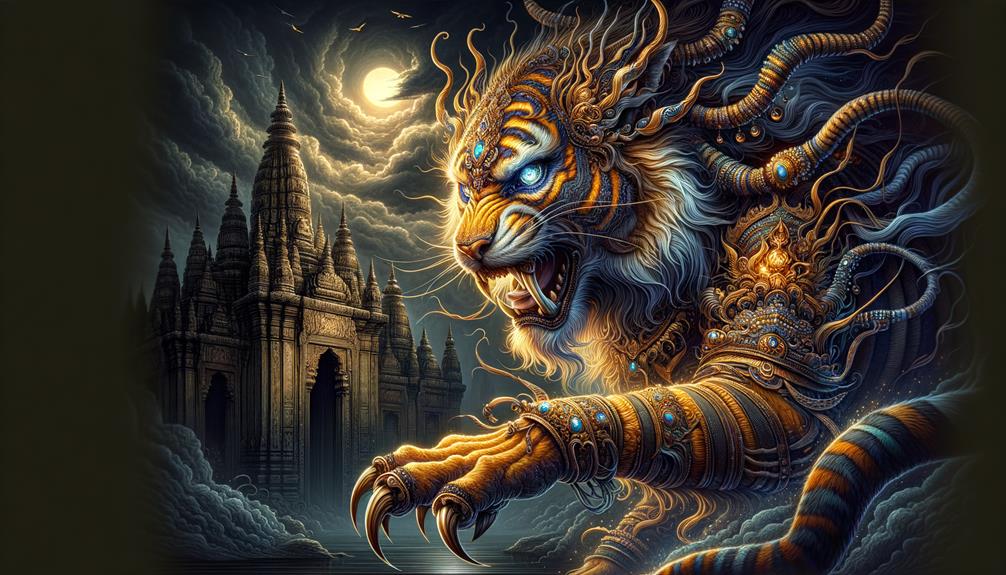
Diving Into the World of Rakshasas: Hindu Mythology's Fascinating Demons
Exploring various cultural interpretations, we now shift our focus to the physical characteristics and supernatural abilities that uniquely define Rakshasas, the captivating spectrum of Indian demon archetypes from Hindu mythology.
Physical Attributes and Shapeshifting Powers
Rakshasas frequently emerge in tales as formidable creatures, their portrayal often marked by sharp claws and fearsome fangs. Yet, their true power lies in their ability to shapeshift, crafting facades to suit their whims. This cunning trait allows a Rakshasa to artfully deceive its unsuspecting victims, be it while donning an animal's guise or mimicking a human form.
Ravana: The Demon King and Master Illusionist
The narrative of Rakshasas is incomplete without mentioning Ravana, the ten-headed Demon King. He's a paragon of the Rakshasa archetype, exhibiting both immense physical strength and masterful illusionary skills. His depiction as a great warrior and a potent Rakshasa underscores the power these supernatural beings wield.
Diet and Behavior: A Glimpse into their Demonic Nature
Adding to their fearsome reputation is their diet, which primarily consists of flesh and rotten food, painting a vivid picture of their demonic essence. The stories of Rakshasas stealing the Pandavas' weapons further highlight their cunning and disruptive abilities.
Rakshasas: Supernatural Beings of Strength and Magic
Looking at these aspects, Rakshasas stand out as complex, supernatural creatures, encapsulating both physical power and magical aptitude. Their narratives, woven with unique characteristics, provide a rich tapestry that enhances our comprehension of Hindu mythology and the diverse cultural context it thrives in.
*Intrigued by the world of Rakshasas?* Delve deeper into their fascinating tales by exploring books like *Myths and Symbols in Indian Art and Civilization* by Heinrich Zimmer. This comprehensive guide provides an enriching exploration of the Rakshasas, their tales, and their significance in Hindu mythology.
Rakshasas in Hindu Epics
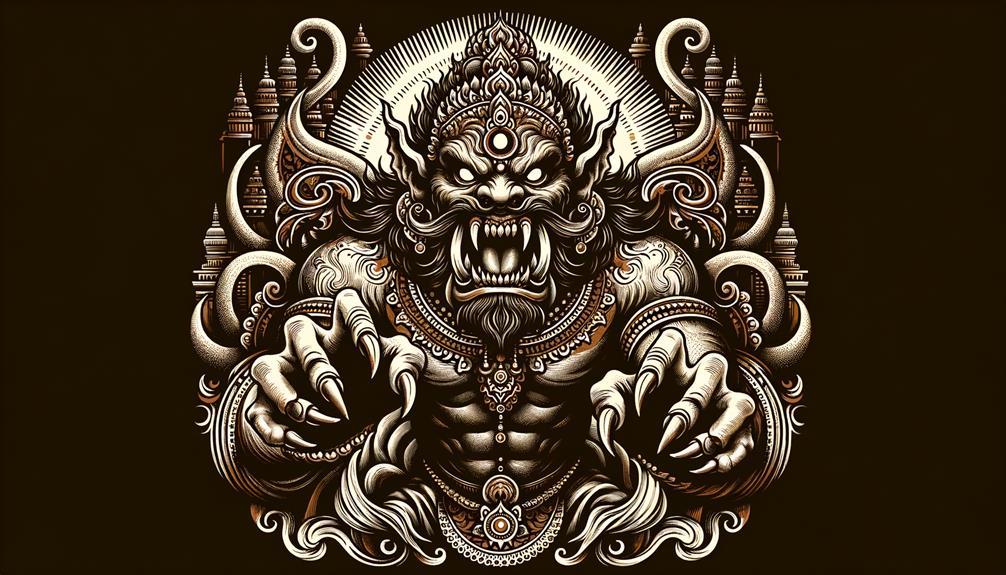
The Fascinating Role of Rakshasas in Hindu Epics
Delving deep into the riveting narratives of Hindu epics, we encounter the intriguing Rakshasas. These captivating entities, birthed from the divine Brahma and the primal force of hunger, hold integral roles, often linked with the guardianship of waters. Their terrifying visages, complete with fangs and sharp claws, are a testament to their potent shape-shifting abilities.
Ravana: The Rakshasas King in Ramayana
Among the most noteworthy Rakshasas in the Hindu epic Ramayana is Ravana. This formidable Rakshasa is a master combatant, whose audacious act of abducting Rama's wife, Sita, triggers the epic Battle of Lanka. Ravana's tussle with Rama and his brother Lakshmana forms a compelling narrative.
Rakshasas Beyond the Antagonist Role: Bhima's Encounter in Mahabharata
Contrary to the common perception of Rakshasas as mere antagonists, the epic Mahabharata presents a multifaceted view. Bhima, a valorous hero of the Pandavas, takes a Rakshasa woman as his wife, unraveling their complex nature. Bhima's interactions with forest-dwelling Rakshasas, including his victory over the cannibal Rakshasa Hidimba, add another layer of depth to the relationship between Rakshasas and humans.
The Diverse Depictions of Rakshasas
The portrayal of Rakshasas ranges from mighty warriors to fierce demonic beings. This diversity mirrors the intricate interplay of good and evil in Hindu mythology. Ultimately, the varied roles of Rakshasas in Hindu epics, from guardians to villains, and their lasting cultural impact, construct a vivid image of these mythical demons.
Rakshasas' Influence on Culture
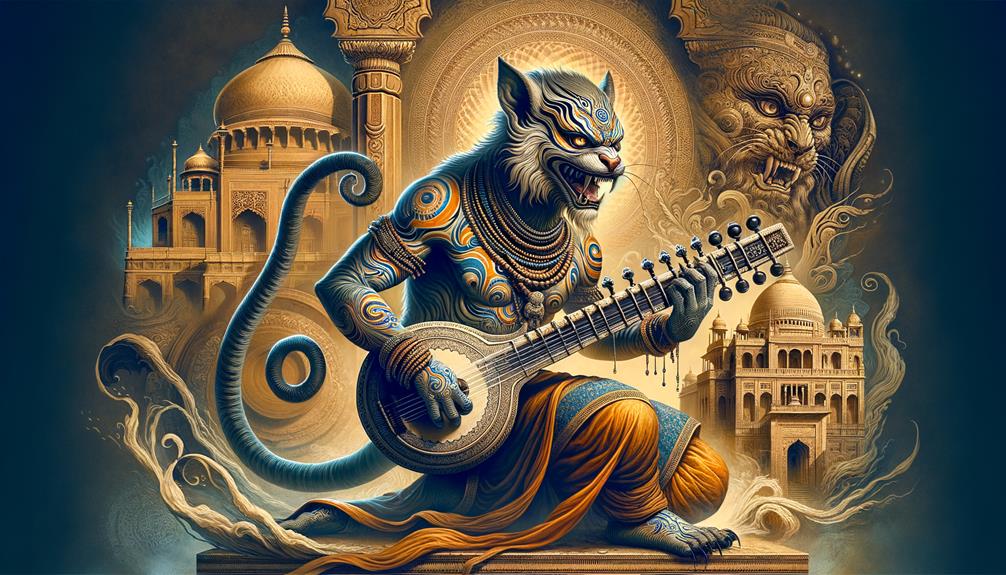
Unlocking the Cultural Impact of Rakshasas
Rakshasas, the gripping characters from Hindu epics, extend their influence far beyond these ancient tales. These mythical demons permeate our culture, shaping narratives and artistic creations across a myriad of traditions. Artists, writers, and storytellers draw inspiration from the raw potency of these Rakshasas, using them to embody the struggle for moral and ethical equilibrium.
Rakshasas in Artistic Expressions
The cultural influence of Rakshasas is evident in many forms. For instance, their grandeur is immortalized in large stone statues, such as Ravana, frequently seen in Hindu temples. A real-world example of this is the city of Angkor Thom and the temple of Angkor Wat, where the artisans of Angkor have breathed life into these demons through intricate stone sculptures.
Rakshasas and the Power of Storytelling
The stories of certain Rakshasas, who used their formidable powers to instill fear in nearby human communities, have been passed down through generations. These tales infuse our folklore with gripping narratives of bravery and salvation, keeping audiences engaged and yearning for more.
Rakshasas in Religious Practices
In religious practices, the invocation of Rakshasas underscores the ongoing battle between good and evil. They symbolize the need for divine intervention to uphold cosmic order, serving as reminders of our spiritual responsibilities.
The Lasting Legacy of Rakshasas
The legacy of Rakshasas continues to echo across time, significantly shaping our cultural and artistic landscapes. Their presence in our everyday lives serves as a testament to their enduring influence.
In a nutshell, Rakshasas have etched an indelible mark on our culture. From breathtaking stone sculptures to captivating folklore and meaningful religious rituals, their influence is palpable. As we continue to engage with these mythical creatures, their legacy is sure to reverberate further, enriching our cultural tapestry.
Notable Rakshasas in Hindu Mythology
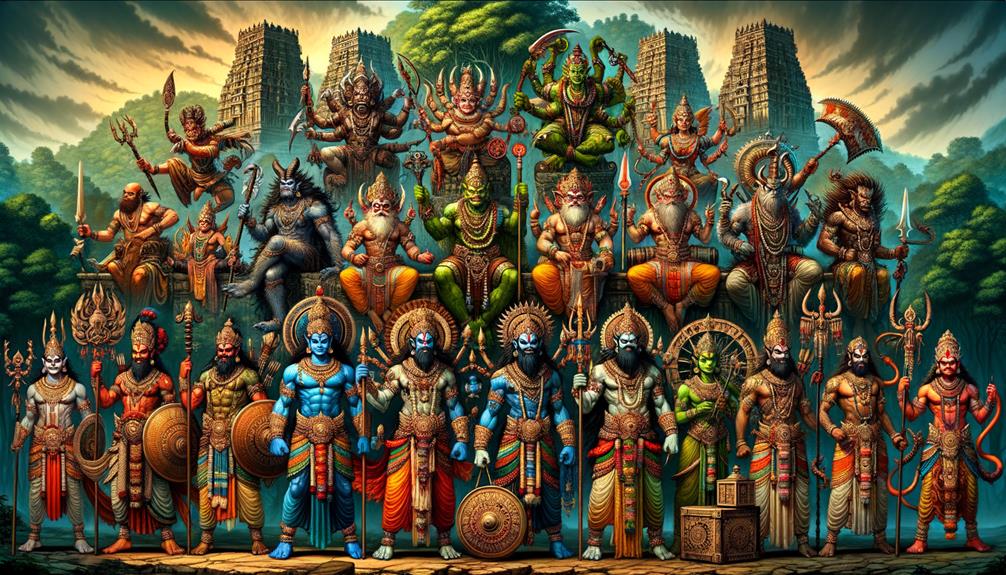
The Fascinating World of Rakshasas in Hindu Mythology
Immerse yourself in the vibrant narrative of Hindu mythology, where you will come face-to-face with a legion of formidable Rakshasas. These mythical beings, renowned for their prowess as warriors, magicians, and illusionists, have etched their presence unforgettably into these ancient stories.
Undeniably, the most renowned rakshasa in Hindu mythology is Ravana. This ten-headed, twenty-armed demon king of Lanka was a consummate master of magic. Ravana was no ordinary adversary, employing both traditional weapons and illusory tactics in battle. However, his power was not invincible. He met his end in a fierce battle against Rama and his brother, Lakshmana.
Ravana's siblings, Kumbhakarna and Surpanakha, were equally formidable Rakshasas in his service. Each possessed unique abilities that played significant roles in the narrative.
The epic Mahabharata showcases a compelling dynamic between humans and Rakshasas. Rakshasas were found fighting on both sides in this epic conflict, including aligning with the Kauravas. One of the Pandava heroes, Bhima, emerged as the bane of several Rakshasas, notably Hidimba and Kirmira. Bhima's victories over these forest-dwelling demons underline the intricate relationships and dynamics that exist between humans and Rakshasas.
*“The Rakshasas of Hindu mythology bring a layer of intrigue and complexity to these ancient narratives, blurring the lines between human and supernatural. Their stories are a testament to the rich tapestry of these captivating sagas.”*
Hindu mythology is a rich source of wisdom and lessons, with stories of Rakshasas adding an element of intrigue and excitement. Whether you're a scholar, a mythology enthusiast, or someone just starting to explore these ancient tales, the remarkable roles and stories of Rakshasas offer a unique window into the vibrant world of Hindu mythology.
*Explore more: 'Rakshasas in Hindu Mythology' by Dr. R. P. Jain, a gripping and comprehensive guide to these mythical beings and their fascinating tales.*
Frequently Asked Questions
Who Is Rakshasa in Hindu Mythology?
Understanding Rakshasa in Hindu Mythology
In the captivating world of Hindu mythology, we encounter a multitude of fascinating beings. One of these is the Rakshasa, a compelling creature of immense power and complexity. Evoking a sense of awe and intrigue, the Rakshasa is not merely a figure of legend, but an embodiment of fierce might and magical prowess.
Rakshasa: The Shape-Shifting Warrior
Born from Brahma, the creator god in Hindu mythology, and his insatiable hunger, the Rakshasa is a fierce warrior. These entities are not only formidable fighters, but they also possess the ability to shape-shift at will, assuming any form they desire. This extraordinary skill allows them to adapt to any situation, making them a force to be reckoned with.
Rakshasa: The Powerful Magician
In addition to their formidable strength and shape-shifting abilities, Rakshasas are also renowned magicians. Their magic is powerful and often antagonistic, reflecting their aggressive nature. As such, they embody the dual essence of power and aggression, creating a balance that adds depth to their character.
In conclusion, understanding the Rakshasa means embracing the complexity of this fierce warrior and powerful magician. With their shape-shifting abilities and aggressive nature, they are an integral part of Hindu mythology, offering a rich tapestry of narrative and meaning. So let's dive deeper into the enchanting world of Hindu mythology and uncover more about these intriguing entities.
Remember, knowledge is power! The more we understand about the world around us, the more we appreciate it. Whether it's the captivating tales of Hindu mythology or the real-world examples we encounter daily, every piece of knowledge enriches our lives. By exploring the Rakshasa's story, we not only learn about Hindu mythology but also about the power of transformation and adaptation – a lesson we can apply in our everyday lives.
Who Is the Powerful Demon in Hindu Mythology?
Ravana: The Supreme Demon of Hindu Mythology
In the vast landscape of Hindu mythology, the entity rising to the pinnacle of demonic power is none other than Ravana. An illustrious figure in the profound epic of Ramayana, Ravana's reputation precedes him, boasting of a remarkable intellect, ferocious strength, and an unwavering devotion to the divine entity, Lord Shiva.
Steering clear of clichés, let's delve deeper into the essence of Ravana's character. His intellectual prowess is not merely a point of discussion but a well-established fact. In the annals of mythology, Ravana is a scholar par excellence, with a deep understanding of the Vedas and the arts.
Turning the spotlight on his physical strength, Ravana's might is unparalleled. His power is such that he's often depicted with ten heads, symbolizing his profound knowledge and abilities that far exceed those of ordinary beings.
At the heart of his character, however, lies an undying devotion to Lord Shiva. Despite his demonic persona, Ravana is among the most devout followers of Shiva, demonstrating that devotion isn't exclusive to the virtuous.
Ravana's character serves as a potent real-world example of the profound duality inherent in each of us—the potential for both tremendous good and destructive evil.
To further explore the intricacies of Hindu mythology, you might consider delving into the "Ramayana" by R.K. Narayan. This engaging and accessible retelling of the ancient epic provides an in-depth understanding of Ravana's complex character.
In conclusion, Ravana stands as the embodiment of the most potent demonic force in Hindu mythology. His intellect, strength, and devotion to Lord Shiva render him a fascinating character, shedding light on the intriguing dichotomies present in the mythological universe. It reminds us that strength and intellect, without the balance of righteousness, can lead to a path of destruction.
Who Is the God of Rakshasas?
Understanding the God of Rakshasas: Brahma
If you are captivated by the rich tapestry of Hindu mythology, you may be intrigued to learn about the fascinating figure known as the God of Rakshasas. Unlike the many other deities that populate the Hindu pantheon, the God of Rakshasas holds a unique position. Widely recognized as the omnipotent Brahma, he is credited with the creation of the formidable Rakshasas.
Brahma: The Master Sculptor of the Rakshasas
Brahma, the cosmic architect, is often depicted as having birthed the Rakshasas from the embodiment of pure hunger. This process illustrates his immense power and creativity. His divine assignment for these mighty beings is the protection of the sacred waters of creation, a task of utmost importance. This unique aspect of Brahma's narrative provides an engaging look at his role within Hindu mythology.
The Rakshasas: Brahma's Mighty Protectors
The Rakshasas, crafted by Brahma, are no ordinary beings. Picture a group of powerful entities, born from hunger, and tasked with the noble duty of safeguarding the holy waters of creation. This vivid imagery brings to life the unique role these beings play within the Hindu mythological universe.
Unraveling the Myth
Within the broad scope of Hindu mythology, the story of Brahma and the Rakshasas adds a layer of depth and intrigue. As the creator of these potent beings, Brahma establishes his place as a key figure, demonstrating his creative power and the importance of his divine role.
What Is the Hindu Devil Called?
Understanding the Hindu 'Devil' Concept: Is There One?
In the fascinating world of Hindu mythology, the concept of a 'devil' does not exist as it does in Christian theology. Yet, there's an intriguing character named *Mara* who often takes on the role of a tempter, luring individuals from their spiritual journeys.
The Alluring Mara: A Demonic Entity?
Let's delve deeper into the enigma of Mara. This entity, while not an exact parallel, is often viewed as a devil-like figure in the Hindu mythos. Their role? To tempt individuals and lead them astray from their spiritual paths – a role eerily similar to the devil figure in other religions.
The Devil in Disguise: Comparing Mara to Other Religious Figures
Mara's role is akin to the devil's temptation in the Biblical story of Adam and Eve. However, it's crucial to understand that Mara is not an embodiment of evil as the devil is often portrayed. Instead, Mara acts more like a metaphorical hurdle on the path of righteousness.
Is Mara Really the Hindu Devil?
In conclusion, while the character of Mara exhibits some devil-like qualities, it would be an overstatement to label them as the Hindu equivalent of the devil.
In the end, what's most important is understanding how these figures serve as metaphors in our spiritual journeys. They teach us about temptation, perseverance, and the inherent struggle between good and evil that exists within us all.

